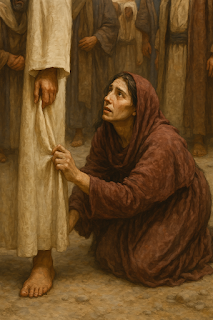"Learn in the little daily things of life to delay action until you get my guidance.
So many lives lack poise. For in the momentous decisions a d the big things of life, they ask My help but into the small things they rush alone. By what you do in small things those around you are most often antagonized or attracted". (God Calling)
When we think of God, we picturize the word awesome - which conveys something grand and unimaginable, so psychologically we associate everything big with God and tend not to bother Him for smaller, everyday life things. But the fact is that not only is God not limited to the extraordinary, but He also wants to be part of and help in everyday small issues and activities of life. For example- when we pray for an important meeting, do we also mention that we need His help to reach on time? Or choice of clothes? Or when we want to buy a home item, do we ask His opinion? A good way to start could be to discuss the days plan with Him when we pray first thing in the morning.
This does not mean every time some small ordinary decision needs to be taken we fall to our knees and pray. Here is where the concept of
arrow prayers comes in, a subject we talked about in an earlier post here.
God is extraordinary and awesome, not because He limits Himself to the extraordinary, but because He addresses, and likes to be involved in the ordinary as well.
While the Bible is famous for its grand and dramatic miracles like the parting of the Red Sea or the raising of Lazarus, it also contains numerous "smaller" or "subtle" miracles. These often highlight God's everyday provision, care, and intervention in the lives of individuals, reminding us that His presence isn't limited to the extraordinary.
Here are some examples of smaller miracles in the Bible:
Old Testament Examples:
1. The Widow's Unending Flour and Oil (1 Kings 17:8-16): During a severe famine, God miraculously provided for the prophet Elijah, a widow, and her son by ensuring that their small jar of flour and jug of oil never ran out. This wasn't a grand display of power, but a consistent, daily provision that sustained them.
2. Detoxification of the Stew (2 Kings 4:38-41): When a pot of stew became poisonous, Elisha simply added some flour, and the stew was made safe to eat. This was a practical, life-saving miracle without much fanfare.
3. Feeding of One Hundred Men with Twenty Loaves (2 Kings 4:42-44): Elisha fed a large group of men with a very small amount of bread, with leftovers to spare. While similar to Jesus's feeding miracles, it's often overlooked due to its smaller scale.
4. The Cloud "as small as a man's hand" (1 Kings 18:43-45): After a long drought, Elijah's servant reported seeing a tiny cloud. This seemingly insignificant cloud was the sign of a massive rain to come, ending the drought and demonstrating God's faithfulness in a small, yet impactful, way.
New Testament Examples:
1. Healing Peter's Mother-in-Law (Mark 1:30-31): Jesus simply took her hand and the fever left her. It was a straightforward, compassionate healing, without the dramatic exorcisms or public pronouncements often associated with other miracles.
2. The Coin in the Fish's Mouth (Matthew 17:24-27): When challenged about paying the temple tax, Jesus instructed Peter to cast a line, promising he would find a coin in the mouth of the first fish caught. This was a specific, unusual provision for a particular need.
3. God's Daily Provision: Beyond specific instances, the New Testament often speaks of God's consistent provision for our daily needs, a constant "smaller miracle" that we often take for granted (Matthew 6:25-34).
4. Changed Hearts and Lives: Perhaps the most significant "smaller miracles" are the internal transformations that occur when individuals encounter God. These are not always outwardly visible, but they represent a profound shift in a person's character, beliefs, and direction, empowered by the Holy Spirit.
5. Changing of Water to Wine - saved the honor of the host.
These "smaller" miracles are significant because they demonstrate God's consistent involvement in the details of life, His compassion for individual needs, and His power working in less dramatic, yet equally profound, ways. They remind us that miracles aren't always about grand spectacles, but often about God's intimate and faithful presence.
God provides for our every need - big or small. When you look back in your life, you will find it full of small things God provided. Small miracles - unasked yet provided.











